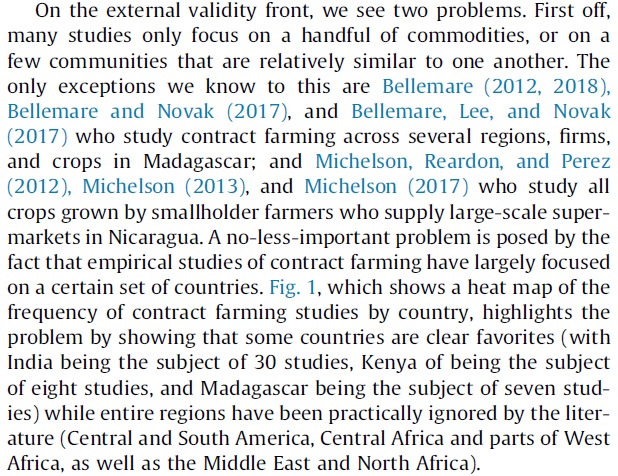I have been working on contract farming for 15 years. The first I came into contact with the institution, in the principal contracts the production of an agricultural commodity to the agent, was in 2004, while doing my dissertation fieldwork in Madagascar.
At the time, I was doing research on agrarian contracts. Consequently, my dissertation’s third essay (a much-improved version of which became this article) was on contract farming.
Many things have changed about my research agenda since then, but this has been the one problem I have consistently worked on (often contre vents et marées) and in the in the intervening years, I have written seven additional articles on contract farming. So after publishing a review of the literature on the topic in World Development with Jeff Bloem in 2018, I thought I was done working on contract farming.
Little did I know that I would get pulled right back in, and to answer one of the big important questions in the literature on contract farming.
In in our 2018 article, Jeff and I had bemoaned the lack of external validity in the literature looking at the welfare impacts of contract farming on the participating households:

In Meemken and Bellemare (2019), just published in Proceedings of the National Academy of Sciences, we substantially improve on both the external and internal validity of the typical contract farming study. On the external validity front, we use comparable survey data from six developing countries; on the internal validity front, several individuals per household were surveyed, which allows incorporating household fixed effects to control for unobserved heterogeneity between households.*
Here is the abstract of this new paper:
Poverty is prevalent in the small-farm sector of many developing countries. A large literature suggests that contract farming—a preharvest agreement between farmers and buyers—can facilitate smallholder market participation, improve household welfare, and promote rural development. These findings have influenced the development policy debate, but the external validity of the extant evidence is limited. Available studies typically focus on a single contract scheme or on a small geographical area in one country. We generate evidence that is generalizable beyond a particular contract scheme, crop, or country, using nationally representative survey data from 6 countries. We focus on the implications of contract farming for household income and labor demand, finding that contract farmers obtain higher incomes than their counterparts without contracts only in some countries. Contract farmers in most countries exhibit increased demand for hired labor, which suggests that contract farming stimulates employment, yet we do not find evidence of spillover effects at the community level. Our results challenge the notion that contract farming unambiguously improves welfare. We discuss why our results may diverge from previous findings and propose research designs that yield greater internal and external validity. Implications for policy and research are relevant beyond contract farming.
And here is the paper’s significance statement:
Achieving the United Nations’ Sustainable Development Goals remains a challenge in many developing countries, and especially in rural areas. Smallholder farmers are often trapped in a vicious cycle of low-intensity farming, low yields, limited market access, and insufficient profits, all of which prevents beneficial investments. Contract farming is commonly seen as a suitable means of linking poor farmers to markets, improving household welfare, and promoting the modernization of the agricultural sector. The available evidence supports the notion that contract farming increases welfare, but external validity is limited. We address this gap using data from 6 developing countries and discuss implications for policy and research.
* Though we improve on internal validity relative to the typical contract farming study, this still falls short of the gold standard–a randomized controlled trial (RCT)–when it comes to internal validity. The only RCT I know of contract farming I know of is this wonderful paper by Arouna et al. (2019).